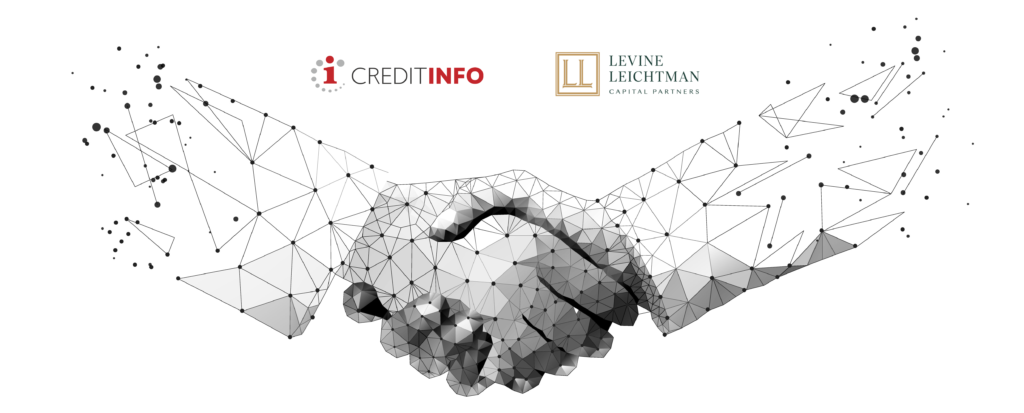Creditinfo Group becomes majority shareholder of Kredītinformācijas Birojs (KIB)

LONDON, UK, March 25th, 2021 – Today, Creditinfo Group – the leading global credit information and decision analytics provider – announced that is has increased its stake in JSC “Kredītinformācijas Birojs” (KIB) to 51%, becoming the majority shareholder.
Earlier this month, the US private equity fund Levine Leichtman Capital Partners (LLCP) became the majority shareholder of Creditinfo Group. As the result of that transaction, the share capital of the KIB joint stock company was increased, with ABLV Bank selling its shares.
The other shareholders of the company, including the leading Latvian commercial banks; AS Swedbank, AS SEB banka, AS Luminor Bank, and AS Citadele banka will remain unchanged and will continue to support KIB by serving on the Supervisory Board of the joint stock company.
Jānis Timmermanis, Chairman of the Board of KIB: “This investment is an important confirmation of the company’s potential to continue to grow despite being a relatively young entity and offer lenders throughout the Baltic region modern solutions with scoring and decision capabilities while also enabling prevention of money laundering.”
Brynja Baldursdóttir, Director of Global Markets Creditinfo Nordics: “This announcement marks a significant milestone for Creditinfo and consolidates our presence in the Baltics as a leader in providing Decision-as-a-service solutions – a key component of the Credit Bureau system. With international knowledge and local market support, Creditinfo solutions are setting a high bar wherever they are implemented.”
KIB was founded in May 2013 and is the first licensed credit information bureau in Latvia. KIB helps banks and financial institutions to manage credit risk and apply best practices in risk management and credit operations. Its activities in the field of data processing are licensed and supervised by the State Data Inspectorate.
Ends.
About Creditinfo
Founded in 1997 and headquartered in Reykjavik, Iceland, Creditinfo is a global provider of credit information and risk management solutions. As one of the fastest growing companies in its field, Creditinfo facilitates access to finance through intelligent information, software and analysis solutions.
With more than 33 credit bureaus today, Creditinfo has the largest presence in credit risk management worldwide, with significantly greater influence than competitors. For decades, it has provided business information, risk management and credit bureau solutions to major lenders, governments and central banks around the world to increase financial inclusion and create economic growth by giving SMEs and individuals access to credit.
Media Contact:
Matt Silver
Babel Agency for Creditinfo Group creditinfo@babelpr.com
+44 (0)7769 266 452
Creditinfo Group announces new majority shareholder

Creditinfo welcomes Levine Leichtman Capital Partners as new majority investor
LONDON, UK, 8 March 2021 – Creditinfo Group, the leading global credit information and decision analytics provider, today announces that the private equity firm, Levine Leichtman Capital Partners (LLCP) has become its new majority shareholder. The firm will help Creditinfo Group to keep expanding operations and support financial institutions with a full suite of best-in-class credit risk management tools.
The announcement marks another significant milestone in Creditinfo’s growth journey, as world leader in providing decision analytics and risk mitigation solutions to lenders, central banks and SMEs continues to expand. The company’s combination of international know-how and local market support, continues to fuel demand for Creditinfo’s decision analytics solutions, which use traditional and evolving data sets to help customers take an intelligent and informed approach to risk and lending decisions.
This new shareholder composition brings new impetus and direction to the company’s growth plans while also maintaining continuity for the business, with Creditinfo founder Reynir Grétarsson retaining his board seat and a significant minority shareholding.
Well-respected industry veteran, Paul Randall – who joined Creditinfo in 2007 – will lead the company through its next phase of growth as the newly appointed Group CEO, working closely with Reynir Grétarsson and LLCP.
“This investment shows Creditinfo’s potential and commitment to enable corporates, SMEs and individuals be active players in the economy” commented Paul Randall, CEO at Creditinfo Group. “We now have a new, eager and dynamic investor on board that will help us increase market penetration and expansion. They also bring a wealth of corporate experience running international businesses that will help us further strengthen our contribution to the credit risk and fintech industry. Our unique position in both advanced and emerging markets and the mix of technology our solution can incorporate give us great hopes for the future with considerable growth potential.”
Erik Nobel, Managing Director at LLCP, commented, “We are excited to support Creditinfo’s expansion and growth through this investment. LLCP’s significant experience investing in companies around the world will enable Creditinfo to further establish its leadership in the credit risk and fintech industry and support to its international client base.”
David Cowan, Senior Managing Director at LLCP, added, “We are thrilled to partner with the Creditinfo team and look forward to supporting the Company’s strategic growth plans. We believe that Creditinfo holds a unique position within their market and are confident in their continued success.”
-ENDS-
About Creditinfo
Established in 1997 and headquartered in Reykjavík, Iceland, Creditinfo is a provider of credit information and risk management solutions worldwide. As one of the fastest-growing companies in its field, Creditinfo facilitates access to finance, through intelligent information, software and decision analytics solutions.
With more than 30 credit bureaus running today, Creditinfo has the most considerable global presence in this field of credit risk management, with a significantly greater footprint than competitors. For decades it has provided business information, risk management and credit bureau solutions to some of the largest, lenders, governments and central banks globally to increase financial inclusion and generate economic growth by allowing credit access for SMEs and individuals.
For more information, please visit www.creditinfo.com
Media Contacts:
Matt Silver
Babel Agency for Creditinfo Group creditinfo@babelpr.com
+44 (0)7769 266 452
About Levine Leichtman Capital Partners
Levine Leichtman Capital Partners, LLCP is a middle-market private equity firm with a 37-year track record of investing across various targeted sectors, including franchising, professional services, education and engineered products. Since inception, LLCP has managed approximately $11.7 billion of institutional capital across 14 investment funds and has invested in over 90 portfolio companies. LLCP utilizes a differentiated Structured Private Equity investment strategy, combining debt and equity capital investments in portfolio companies.
LLCP’s global team of dedicated investment professionals is led by seven partners who have worked at LLCP for an average of 21 years. The firm currently manages approximately $7.8 billion of assets – including its most recent flagship fund, Levine Leichtman Capital Partners VI, L.P., which closed in 2018 with $2.5 billion of committed capital, and its most recent European fund, Levine Leichtman Capital Partners Europe II SCSp, which closed in 2020 with €463 million of committed capital. LLCP has offices in Los Angeles, London, The Hague, Stockholm, New York, Chicago, Charlotte and Miami.
Media Contacts:
Mark Semer or Ross Lovern Kekst
CNC +1 (917) 439-3507 or +1 (917) 842-7205
Creditinfo’s new KYC tool allows affordable background checks of international business partners

Creditinfo is the first company in Estonia to bring the shared KYC utility “Know Your Client” to the market. The tool gathers the data an entrepreneur needs to know about clients and business partners from both Estonia and international reliable databases covering the whole world.
According to the rules of the fight against money-laundering and financing of terrorism, each company is responsible for ensuring that every business transaction and cooperation agreement complies with the terms stated in the anti-money laundering law (the Anti-Money Laundering and Countering the Financing of Terrorism Act). In essence, it is the duty of a company to know their clients and business partners in case of both single transactions and longer business relationships.
“Every entrepreneur needs to check the background of the business partner because when the transaction reaches the bank, it may already be too late. The accounts may be frozen and you could end up losing the money,“ Jaanus Leemets, head of Creditinfo’s product development unit explained. “One questionable transaction, no matter how great or small sums are involved, may significantly increase the overall risk rating of the entrepreneur.”
The background checks of companies and individuals operating in Estonia has been a widely available service for years, but checking the background of international partners has been a great challenge for small and medium-sized companies. Access to reliable international databases is very expensive, and the offered solutions are often not suitable for checking single transactions or compiling detailed reports of the parties involved.
“Banks spend millions of euros a year on anti-money laundering background checks, leaving entrepreneurs stranded since they have no resources to afford these services. The results of public search portals are also often not reliable, extensive nor up-to-date enough in their content, especially with international companies, as well as also domestic inquiries. We therefore created a tool that makes inquiries from dozens of different reliable, international databases. The new tool is affordable to small businesses as well and it is also simple to use for single inquiries.“ Leemets added.
To get the entrepreneurs started, Creditinfo offers consultations on the correct implementation of the background check and its proficiency. There is also the option of joining the KYC business school in order to understand the essence of KYC regulations, the precise duties, everyday needs of their companies, and all available options to regularly check the background of clients and business partners without spending too much time.
Media contact:
Rain Resmeldt Uusen
Marketing Manager, Creditinfo Estonia
Email: rain@creditinfo.ee
Banking for the future of Sri Lanka

Interview with Thimal Perera – Deputy CEO, DFCC Bank
Our Senior Business Development Manager, Joe Bowerbank, caught up with Thimal Perera, Deputy CEO of DFCC Bank. Thimal provided a number of interesting insights into how DFCC is strategically dealing with the challenges of operating in 2020 and building a roadmap to continue delivering a first-class banking experience going forward. Thimal has worked in both local and international banks across the globe, looking after a number of different areas from SME and retail, to digital transformation amongst others. This interview focuses on digitalization and credit risk – two areas that have been hot topics for Creditinfo’s clients this year.
Phone model, mobile internet and missed calls might determine whether you get credit

Press Release
Ever more personal data will in the future determine whether people can get a loan or buy goods on installment. If a person consents, before a decision is made about granting them credit they may be asked for permission to examine not just repayment of past loans but also other private information: what model of phone they have, whether they actively use mobile internet, whether they often do not answer calls. It may even be suggested that they play a real-time game whose outcome will determine whether they as a customer are creditworthy.
While companies that give credit have typically relied only on information gathered by financial institutions, now more and more personal data will influence decision-making. Whether credit is granted, how much, and on what terms may depend on whether a customer is ready to share that information.
“There’s no doubt that personal data can only be used with the person’s consent,” Creditinfo Head of Decision Analytics for the Baltic states, Maxim Fetisov immediately stresses. “But practice shows that openly sharing additional information increases a creditor’s trust, lets them more accurately assess each customer’s trustworthiness, and even allows customers to expect more favorable credit terms.” Research conducted by Creditinfo has shown that knowledge about a customer’s personal habits gives creditors just as many insights as formal data.
A recent conference “Scoring Kitchen” by Creditinfo, which rates the creditworthiness of companies and individuals in more than 50 countries, addressed what is new in the scoring process. For example, a study was done together with telco company on how people’s financial reliability relates to their everyday behaviour. Analysis of the data revealed that even how long people use one telecom operator’s services shows which ones are financially more trustworthy: the longer someone uses the same telco’s services, the more financially reliable their loan-payment history is too. And on the contrary, customers who frequently change operators generally demonstrated a higher level of riskiness.
Those without 4G and who use mobile internet little fall into a higher-risk group
Creditinfo analyst Allan Anyona, who took part in the study, also notes that individuals who are less financially reliable tend to have more modest internet plans and rush to connect as quickly as possible to free Wi-Fi networks at home and elsewhere.
Moreover, it was observed that the more advanced the network connection a potential customer’s phone supports, the greater their creditworthiness. So customers using phones that support 4G network requirements are seen more favorably than those whose phones only work on a 2G network or do not make such information available.
Many missed calls points to a frequent debtor
Creditors get useful insights as well from data about whether a potential customer often fails to answer incoming calls. People were divided into five categories: those who fail to answer calls very often, often, an average amount, rarely, and very rarely. It turns out the most financially reliable were those in the last two groups. The riskiest customers, meanwhile, were among the people who “miss” calls more often than others.
“We assume that people experiencing financial difficulties avoid answering calls as they do not want to talk with creditors or with relatives to whom they may also be in debt,” the Creditinfo Group analyst explains.
With smart devices revealing more and more information about consumers, creditors are eager to actively look at other habits too – like the use of a mobile wallet. The more punctually a customer tops up their mobile wallet limit and the bigger their income, the higher their credit rating will be. Conversely, the smaller someone’s income is and the longer they use credit provided by a telco, the more cautiously other lenders will view them. So those people should not be surprised if they are not allowed to buy a more expensive item on installment or are refused a bigger credit limit on a payment card.
Games show how you will behave with real money
Seeking to get a more objective assessment of a customer’s creditworthiness and to automate the decision-making process, psychometric data are being used ever more actively. A future customer may be asked to play a quiz that takes 5-7 minutes. It may be a series of questions, like: how would you use an unexpected gift of €200 – would you spend it on entertainment or save it? Studies show that the customers who meet their financial obligations most responsibly tend to choose the answer ‘I would save it’ in the game, while the riskiest customers more often choose ‘I would spend it on entertainment’.
“We realize that over time skilled players learn to choose those answer that creditors view more favorably. But in calculating any individual’s rating, dozens of other factors are also assessed, like their insurance history, repayment of earlier loans, payment of utilities bills, and so on,” CEO of Creditinfo Lithuania, Aurimas Kačinskas notes.
The pandemic also altered how companies are rated – there are new factors
The CEO of Creditinfo Lithuania says the challenges of the pandemic in 2020 are also changing the rules for rating businesses. New factors have arisen that impact credit scores. For instance, a new indicator for the impact of Covid-19 has altered the current ratings of companies all over the world. It shows how the coronavirus pandemic has impacted every area of business (e.g., tourism, hotels, manufacturing, transport, etc.) and how companies’ creditworthiness relates to the geographic location of their operations, demand for the goods they produce, and possibilities for quickly recovering after restrictions and quarantine end. Businesses’ ratings are also heavily influenced by a ‘Collection’ indicator that reflects whether a company punctually settles with its creditors.
“We have no doubt that the new factors that are coming up will have an increasing significance for companies’ credit scores – in a time of economic turmoil, it’s very important for creditors to objectively assess every customer’s riskiness and make the most accurate decisions possible,” Maxim Fetisov, Head of Decision Analytics in the Baltics says.
-ENDS-
About Creditinfo
Established in 1997 and headquartered in Reykjavík, Iceland, Creditinfo is a provider of credit information and risk management solutions worldwide. As one of the fastest growing companies in its field, Creditinfo facilitates access to finance, through intelligent information, software and analytics solutions.
With more than 33 credit bureaus running today, Creditinfo has the largest global presence in the field of credit bureau and risk management, with a significantly greater footprint than competitors. For decades it has provided business information, risk management and credit bureau solutions to some of the largest, lenders, governments and central banks globally – all with the aim of increasing financial inclusion and generating economic growth by allowing credit access for SMEs and individuals.
For more information:
Media Contacts:
Caterina Ponsicchi,
Marketing Director, Creditinfo Group
Mala’a launches Credit Bureau System in Oman

Creditinfo and Mala’a’s strategic partnership started in January 2019 and since then, the teams have been developing a state of the art Credit Bureau System, connecting members, integrating with new data providers, and ensuring the system is protected to the highest security standards.
On November 18th 2020, Mala’a officially launched its state-of-the-art Credit Bureau System to the banking sector in Oman. This announcement affirms Creditinfo’s commitment in helping businesses globally make better use of information and data, along with providing the latest software solutions to enhance risk decisioning strategies. Creditinfo have over the years strengthened our partnerships with Credit Bureaus globally by delivering Creditinfo’s technology with core credit bureau systems, infrastructure expertise, operational set up, self-service platforms, alternative data, digital lending solutions among other tailored services.
Creditinfo will continue partnering with Mala’a into the next phase of our project. The teams will be ensuring we expand the membership to new sectors such as telecommunication and insurance and delivering new value-added services like Instant Decision Solutions, Mobile Lending Platforms and Portfolio Management tools. This will help lenders and organizations improve the application process and the customer experience for Oman residents.
Lenders across the GCC are changing the way in which they operate and make decisions on an individual’s creditworthiness moving to a digital based approach while harnessing traditional and non-traditional data. With Creditinfo Gulf based in Muscat now firmly installed in the region Creditinfo will remain at the forefront of facilitating access to finance in each of our markets and help lenders to reduce risk and increase profitability. We look forward to continuing assisting with cutting-edge technology in the region and helping Lenders and Telcos increase profitability without increasing the risk of new business.
Gary Brown, MD, Creditinfo Gulf.
Creditinfo West Africa Hits 20 Million Contracts

Creditinfo West Africa today marked a major milestone by hitting the 20 million contracts threshold and growing, in the regional Credit Information Bureau (BIC) making it a historic day for Creditinfo West Africa, the entire UEMOA region and Creditinfo Group.
Six Corporate Image Improvement Tips for CFOs

It is customary to assume that the reputation and image of a company is mostly a prerogative of the general manager and the marketing unit. Credit is also given to employees who are in direct contact with the customers, yet financial decision-makers mostly go unnoticed. In this article, I will share some ideas about the huge influence Chief Financial Officers may have on the good corporate image.
Creditinfo IBCH (Ukraine) welcomes Kateryna Danylchenko as new GM

Kateryna has been appointed as GM of IBCH, a Credit Bureau and Analytics company in Ukraine in which Creditinfo has been a strategic investor since 2006.
Players in Baltic Markets (Latvia, Estonia) and Iceland Measure Risk better, benefitting from Covid-19 Impact Score Developed by Creditinfo.

Credit providers need to understand how COVID crisis affected their counter-parties and customers in order to better manage risk exposure and reduce losses. Current scoring models are unable to fully answer these needs as they were developed on pre-crisis data and need time to adjust to new conditions.




